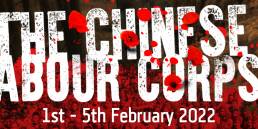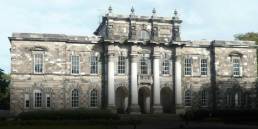The countdown to crisis begin in earnest in 1905 as political changes in Westminster set a course towards Home Rule. The Unionists knew that a Third Home Rule Bill would be introduced when Asquith and the Liberals were elected in 1905 and, after the passing of the Parliament Act in 1911, which removed the House of Lords veto it became inevitable that it would inevitably become law. Unionists felt that the deal between the Irish Nationalists and the Liberals to keep them in power was questionable and that such huge constitutional changes should be put to the entire population in a referendum. The Ulster Unionist leadership called it a conspiracy and questioned whether it was truly democratic. They believed that despite a majority of MPs being in favour of Home Rule, the majority of the British public were opposed to it.
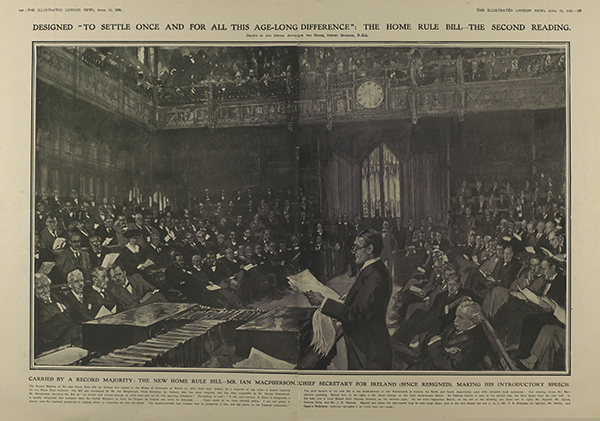 It was a very similar political situation to the recent post Brexit parliament which continued to frustrate Prime Minister Theresa May’s attempts to deliver an exit from Europe. Although the British public voted 52% to 48% in favour of Brexit, about 73% of all MPs favoured Remain. That majority included 56% of all Conservative MPs. Many believed that Parliament was out of step with the country and demanded that they should stop frustrating the stated will of the people to leave Europe. Unionists in 1912 made the same case about Home Rule, they believed that it was such a huge constitution, economic and political issue that it should be put to the public in a referendum.
It was a very similar political situation to the recent post Brexit parliament which continued to frustrate Prime Minister Theresa May’s attempts to deliver an exit from Europe. Although the British public voted 52% to 48% in favour of Brexit, about 73% of all MPs favoured Remain. That majority included 56% of all Conservative MPs. Many believed that Parliament was out of step with the country and demanded that they should stop frustrating the stated will of the people to leave Europe. Unionists in 1912 made the same case about Home Rule, they believed that it was such a huge constitution, economic and political issue that it should be put to the public in a referendum.
The Home Rule question was more than just about the system of government Ireland should have, it was a constitutional struggle that shaped the modern United Kingdom geographically, politically and religiously. It led to the creation of the modern United Kingdom of Great Britain and Northern Ireland and many argue began or at least accelerated the disintegration of the British Empire, or perhaps more positively the creation off the present Commonwealth. However at the time many felt that Home Rule would be disastrous economically and constitutionally. The fact that such huge changes were being made by a Government whose legitimacy was questioned led many to take steps to oppose it which were extreme and verged on rebellious. Many of the actions promoted by leaders such as Edward Carson and James Craig were seen as mere demonstrations to galvanise protestant opinion to resist Home Rule, and as a tactic to ruin and wreck the Bill, which some saw as ultimately ‘bluff’. To others they were the preparations for armed rebellion and ultimately civil war, across the United Kingdom political agitation urged armed resistance, finds were collected and men armed with the clearly stated aim of taking over a part of Ireland in defiance of the law of the government. When in 1913 the reliability of the army to challenge such rebellion was in doubt and those who supported Home Rule took to arms many saw the course set for bloodshed.
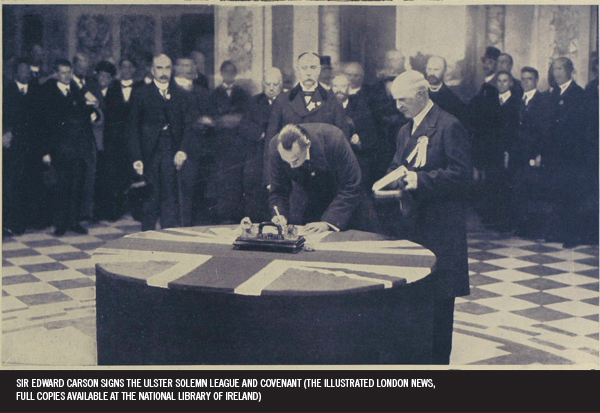 In September 1912 nearly 500,000 people signed the Ulster Solemn League and Covenant and in January 1913 the Ulster Volunteer Force was set up. In the background the Bill was still making its way through Parliament to its inevitable conclusion, which Unionists threatened would trigger their threat to take over the governance of those areas of the north of Ireland that they could control. It was this threat and the ideological and constitutional step of setting up a Provisional Government which made Partition a reality. On the eve of the conference of the Ulster Unionist Council set for 23 September 1913, Sir Edward Carson wrote to Bonar Law setting out clearly that he had moved on from the idea of a demand for exclusion as a wrecking tactic, and was now prepared to embrace it as a solution to the Bill, only subject to the difficulties of defining the borders of Ulster for this purpose (A. Jackson, Home Rule, 2004, p.144).
In September 1912 nearly 500,000 people signed the Ulster Solemn League and Covenant and in January 1913 the Ulster Volunteer Force was set up. In the background the Bill was still making its way through Parliament to its inevitable conclusion, which Unionists threatened would trigger their threat to take over the governance of those areas of the north of Ireland that they could control. It was this threat and the ideological and constitutional step of setting up a Provisional Government which made Partition a reality. On the eve of the conference of the Ulster Unionist Council set for 23 September 1913, Sir Edward Carson wrote to Bonar Law setting out clearly that he had moved on from the idea of a demand for exclusion as a wrecking tactic, and was now prepared to embrace it as a solution to the Bill, only subject to the difficulties of defining the borders of Ulster for this purpose (A. Jackson, Home Rule, 2004, p.144).
With partition as a solution planted in his mind, Carson led the 500 delegates to the conference of 23 September to endorse the Proclamation of a Provisional Government for Ulster. There was a very big proviso – that although the Provisional Government now existed it would not take executive power until necessary to resist a Nationalist Government set up in Dublin, and then do so holding Ulster ‘In Trust’ for the British Nation. This position solved the dilemma which Unionists faced of being seen as rebels, they still did not embrace a separatist ideology and saw their actions as necessary and temporary holding ‘Ulster’ in trust. They separated the will of the present Parliament from the will of the British nation claiming that their actions of defying Parliament was still democratic.
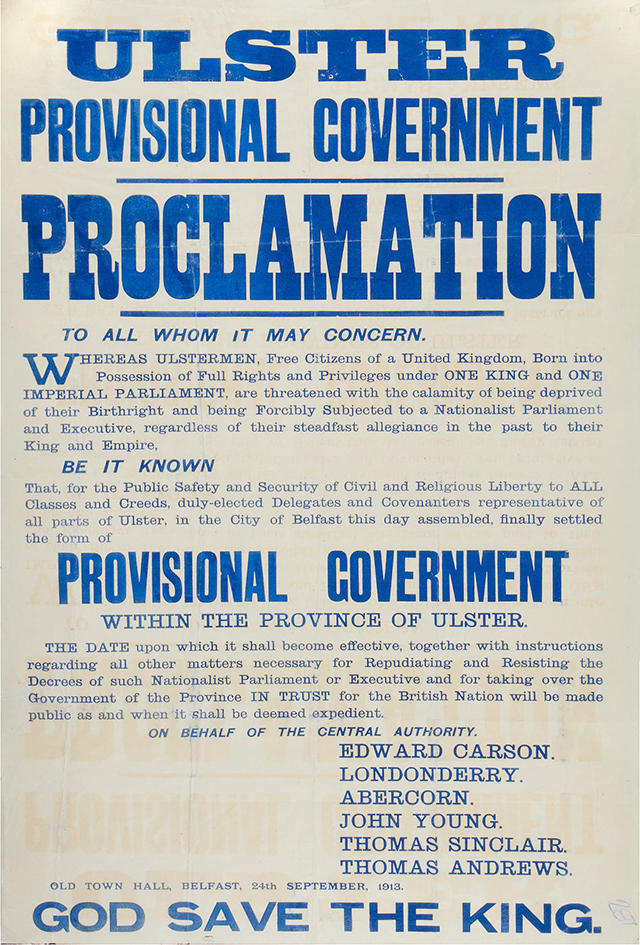 The concept of a Provisional Government taking armed action to defend the will and rights of the nation and holding government in trust for the people was interestingly and ironically mirrored in concept and language by the Irish Citizen Army and Irish Volunteers which had been set up by the Nationalists to mirror the UVF, when on Easter Sunday 1916, they issued their own Proclamation of a Provisional Government. Indeed the leader and thinker behind the Easter Rising Patrick Pearce looked upon the Unionist action and the rising of the UVF with a degree of admiration and it was certainly an inspiration for his actions. The two documents the Proclamation of a Provisional Government of Ulster, and the Proclamation of an Irish Republic 1916 are remarkable documents and are foundational documents to the period
The concept of a Provisional Government taking armed action to defend the will and rights of the nation and holding government in trust for the people was interestingly and ironically mirrored in concept and language by the Irish Citizen Army and Irish Volunteers which had been set up by the Nationalists to mirror the UVF, when on Easter Sunday 1916, they issued their own Proclamation of a Provisional Government. Indeed the leader and thinker behind the Easter Rising Patrick Pearce looked upon the Unionist action and the rising of the UVF with a degree of admiration and it was certainly an inspiration for his actions. The two documents the Proclamation of a Provisional Government of Ulster, and the Proclamation of an Irish Republic 1916 are remarkable documents and are foundational documents to the period
Related Posts
23/03/2022
Belfast mathematician in NASA
Dr Caoimhe Rooney works at Nasa's Ames Research Center in the United…
11/02/2022
First Home for Northern Ireland Parliament
The first permanent home of the Northern Ireland Parliament was the…



